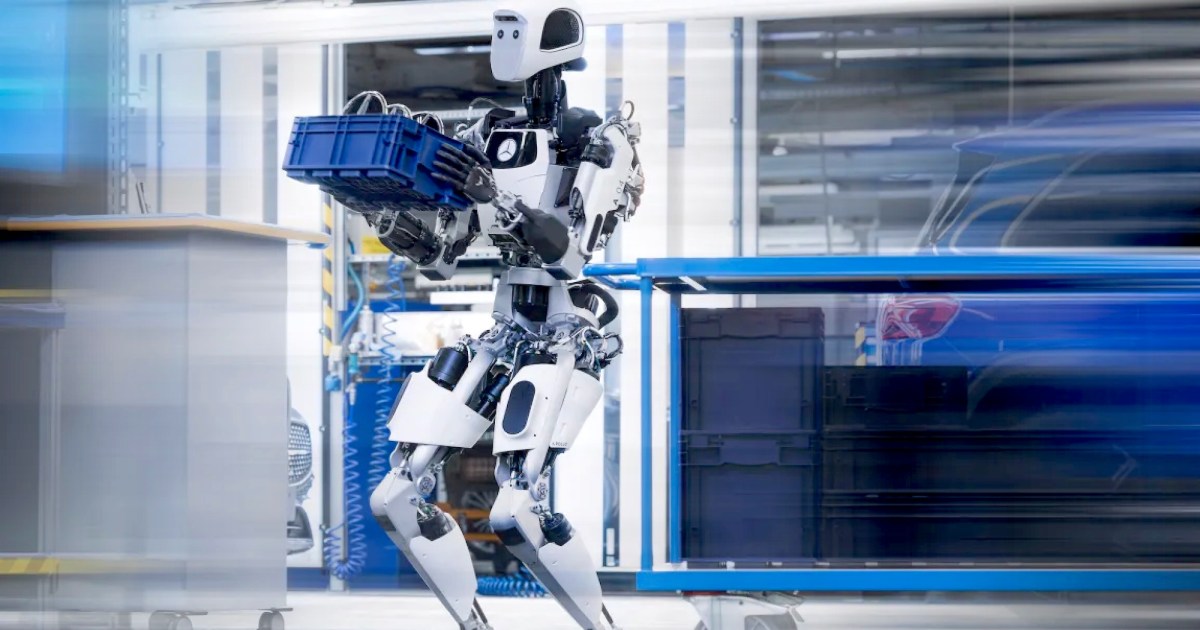
Humanoid robots have been coming on leaps and bounds in recent years, and some major companies are starting to take note.
Mercedes-Benz, for example, has just entered into an agreement with Texas-based robotics specialist Apptronik to collaborate on identifying applications for highly advanced robots that could be deployed by the auto giant. The deal will involve a trial that will see Apptronik’s Apollo humanoid robot work alongside Mercedes’ human workers on the factory floor.
As part of the trial, the robot will bring vehicle parts to the production line for workers to assemble, while also delivering the totes of kitted parts later in the manufacturing process.
“When we set out to build Apollo, an agreement like the one we’re announcing today with Mercedes-Benz was a dream scenario,” Jeff Cardenas, co-founder and CEO of Apollo, said in a release. “Mercedes plans to use robotics and Apollo for automating some low skill, physically challenging, manual labor — a model use case which we’ll see other organizations replicate in the months and years to come.”
We are ecstatic to be collaborating with @MercedesBenz to empower staff in its manufacturing facilities with state-of-the-art technology that automates physically demanding, repetitive and dull tasks that people don't want to do. Stay tuned, this is just the beginning. pic.twitter.com/jIXj8uGTKh
— Apptronik (@Apptronik) March 15, 2024
The fear with advanced robotics — and even more so with the increasingly skillful humanoid robots — is that they’ll replace large numbers of human workers. Apptronik is clearly making the case for robot assistance rather than replacement. Mercedes executive Jörg Burzer echoes this approach, explaining that the idea is “to fill labor gaps in areas such as low skill, repetitive, and physically demanding work, and to free up our highly skilled team members on the line.”
Apollo is the culmination of Apptronik’s dedicated efforts in creating more than 10 other robots, including NASA’s Valkyrie humanoid robot. It stands at 5 foot 8 inches and tips the scales at 160 pounds. The robot can handle payloads as heavy as 55 pounds and operate for four hours on a single charge. Batteries can be quickly swapped out to maximize efficiency.
Apptronik is far from the only company involved in developing a new wave of humanoid robots, with a growing number of them also eyeing the auto sector. In January, for example, California-based Figure inked a similar deal with BMW with a view to deploying its own humanoid robot at the carmaker’s plant in Spartanburg, South Carolina.
Tesla, too, is working on the Optimus bipedal robot, while Xiaomi is developing the CyberOne. And there is of course Boston Dynamics, which continues to work on highly versatile robots for workplace deployment.
Editors’ Recommendations
Denial of responsibility! Planetconcerns is an automatic aggregator around the global media. All the content are available free on Internet. We have just arranged it in one platform for educational purpose only. In each content, the hyperlink to the primary source is specified. All trademarks belong to their rightful owners, all materials to their authors. If you are the owner of the content and do not want us to publish your materials on our website, please contact us by email – admin@planetconcerns.com. The content will be deleted within 24 hours.